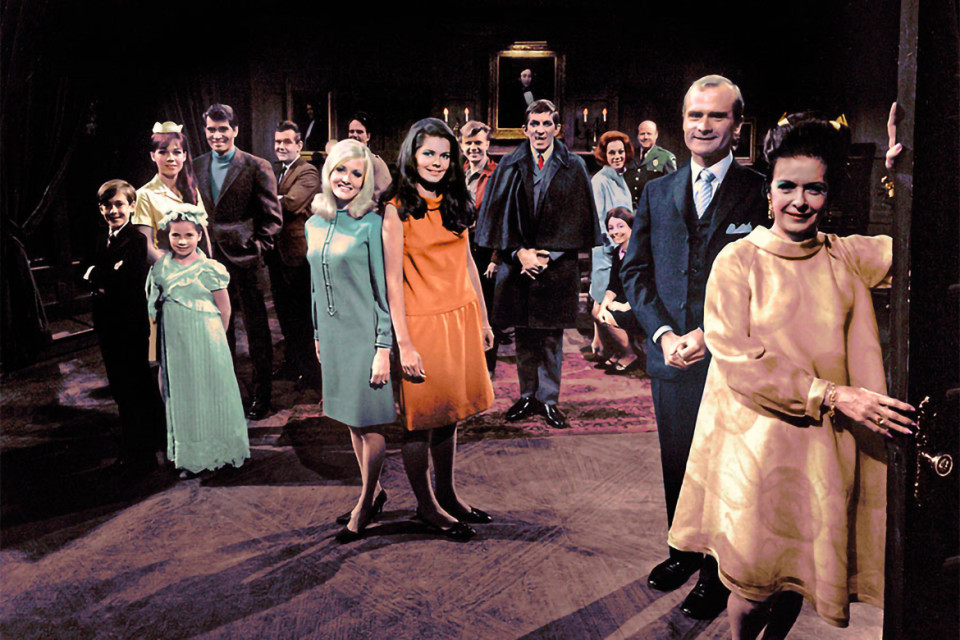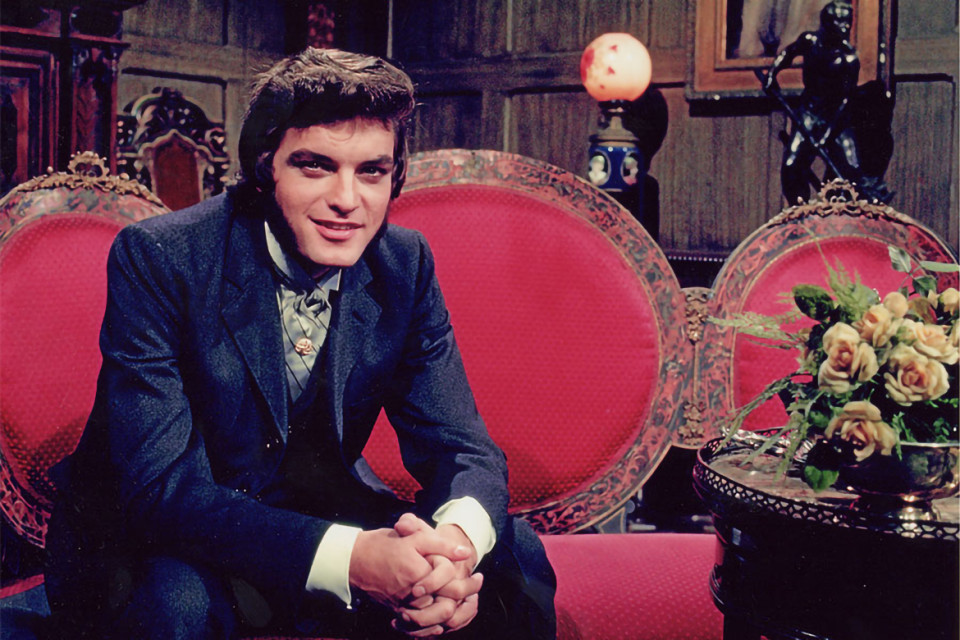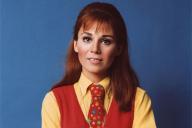The haunting theme music plays as the lilting gothic graphic title floats across the crashing waves, and it all becomes poetic, romantic and terrific, with an emphasis on “terror” – and yet not.
Such is the opening credit sequence for Dark Shadows – a television show ahead of and before its time, present, past or parallel time.
Initially screened on ABC-TV from 1966 to 1971, Shadows was a spooky weekday soap opera that took the world of afternoon viewers by storm -- literally, thanks to its coastal New England setting.
The brainchild of prolific producer/director Dan Curtis (The Night Stalker, The Winds of War), the series gained a massive following (peaking at 20 million viewers) that originally consisted of the era’s then-significant population of stay-at-home moms.
Joining these early home-engineers were countless new-color-TV-buying members of America’s work and education force, including droves of elementary, high-school and college students who hurried home at day’s end to gaze into the Shadows.
Loyal fans of the show (dubbed “DS” in certain Shadows circles), young or older, made certain not to miss one bit of the melodramatic bite provided by its expansive cast, which served as a repertory group playing multiple roles over a compelling five-year-run.
What began as a Gothic suspense serial, embellished by murders and mysteries, morphed into strikingly unusual territory, especially for daytime TV: the periodically horrific but somehow always inviting lives, demises and curses of various vampires, witches, Frankenstein-like monsters, werewolves, and assorted other supernatural beings.
Such unique ghouls and goings-on were set within the isolated confines of their own little world: Collinsport - a fictitious seaside community in Maine named for the wealthy, eccentric and eerie Collins family whose ominous cliffside estate - Collinwood - consisted of a large mansion and a smaller, creepier, abode referred to as the “Old House.”
The elaborately engrossing plots switched centuries from then-contemporary 1960s/1970s existence to life in 1795 to 1897 and back again, with the added wrinkle of alternate-time frames in later episodes.
The mainstay of the brooding Collins family included the 200-year-old vampire Barnabas Collins, rivetingly performed by the late Jonathan Frid, who joined the series in 1967, and whose presence sky-rocketed the previously-light Dark Shadows ratings from cancellation to salvation.
Viewers soon became captivated with Barnabas, who they eventually learned was stricken with his undead lot in life beginning in 1795 by the jealous witch Angelique, a resourceful French sorceress of a servant girl played by the moon-eyed beauty Lara Parker.
Barnabas had spurned her heart due to an obsession of his own…Angelique’s ruling superior - the raven-haired and oh-so-innocent Josette DuPrés, portrayed with affectionate aplomb by Kathryn Leigh Scott, who also played Maggie Evans, the Collins family governess (and 20th Century twin to Josette); Rachel Drummond, the gentle school teacher, and Lady Kitty Hampshire, the recently-widowed, and slightly money-hungry American-British import (the latter two of which were Josette’s twin 19th Century incarnations).
Into this double toil of trouble eventually arrived Quentin Collins, as dashingly delivered by the swashbuckling David Selby, adorned with lengthy debonair sideburns and a full-length frock coat, both of which became trademarks adored by fans. Quentin first materialized in late-1968 as a silent apparition who communicated with the young David Collins (David Henesy) by a mystic phone connection.
In the 1897 storyline he, like Barnabas, became forever linked with Angelique. All three were immortal, and remained essentially the same characters throughout the show’s middle -to-late episodes.
While Scott’s quadruple treat of characters churned the passion of Frid’s ravenous Barnabas, Selby’s daring Quentin became enamored with his own share of strong-willed women, including Angelique. Says Parker: “David is an amazingly charismatic actor…who brought to Quentin a wonderful brooding countenance…and the twinge of Kentucky [in actuality, West Virginia] in his accent. He always takes his work very seriously.”
Selby, who later became a series-regular on two of the era's most popular prime-time soaps (Flamingo Road, 1980-1982; and Falcon Crest, 1981-1990), was indeed serious about playing Quentin, so much so he at first feared mainstream TV watchers might not embrace his slight Southern drawl once the character began to speak in 1897.
“Oh, no,” he thought, “The audience will hear my voice, and that will be the end of it.” But such was not the case. The viewers’ ensuing romance with Selby soon rivaled that of Angelique’s interest in Quentin, as well as the increasing respect from his peers.
“I just love David,” says Scott who, while on Shadows, had performed a scene with Selby from August Strindberg’s play, Miss Julie, while both attended the Actor’s Studio in New York, circa 1968. “We loved working together and we still do,” Scott declares.
The actress makes reference to various reunions with Selby, Parker and Frid including their cameos in Tim Burton’s big-screen Shadows re-do in 2012, in which Johnny Depp resurrected Barnabas Collins, as well as at annual Dark Shadows Festivals.
The 50th Anniversary edition is set for June 24 to 26 in Tarrytown, New York on the grounds of Lyndhurst estate, the location for the 1970 film House of Dark Shadows, and it’s 1971 sequel, Night of Dark Shadows.
Scott has penned several popular nonfiction books about Shadows, as well as three non-DS novels, and, as she assesses, Frid brought “a certain vulnerability” to his portrayal of Barnabas on the original TV series, which was remade as a prime-time weekly series by NBC-TV in January 1991 with Ben Cross in the lead.
He played a seemingly unsavory fellow whose relationship with the other characters became “very specific because of Jonathan’s ability to add different layers to Barnabas.”
Due to Frid’s increasing popularity, the actor’s presence was sometimes requested four to five days a week, a hectic work-load then-unheard of for daytime soaps. Subsequently, he was at times overwhelmed, and would periodically - and understandably - forget his lines.
Parker, like Scott, was a loyal friend to Frid, and explains how not knowing certain scary words worked in his favor. “Jonathan’s slight anxiety of sometimes missing a cue translated so perfectly into the character of Barnabas, who was racked with guilt and anguish because he was compelled to take blood and often kill his victims.”
Consequently, Parker says Frid (who died at 87 in 2012, only months before the Burton-Depp DS debut) accomplished what actors of the 1960s-burgeoning “method” form of acting strived to achieve.
“He brought a personal emotion into the moment he was playing. He was a Shakespearean actor with a marvelous voice and a great presence, and he gained an amazing kind of dour seriousness in his performance due to his extensive experience in live theatre, [including roles as Macbeth and Richard III].”
As Frid himself once assessed, his classical training helped make Barnabas “larger than life.” Meanwhile, too, he frequently searched for “other values” when playing any role. “I always pick two poles with a character and dance in between,” he said.
Off-stage or screen, Frid was as elegant as Fred Astaire. As Parker maintains, “Jonathan was a sweet, congenial man…very kind, gentle, and gentlemanly…the absolute opposite of Barnabas, at least in the beginning, when the character was more sinister.”
“Barnabas longed to become human again…to rid himself of his curse,” continues Parker, who has authored several Dark Shadows-based novels, including Angelique’s Descent. “He wasn’t like [the Dracula character] who was just a pure evil vampire with no motivation. Underneath the evil, there was a reality of agony and heartbreak, and that made his character, and Jonathan’s performance, so rich.”
In like manner, Parker says “Angelique was a witch but she had had her heart broken as well. And all of her machinations and spells were weaved to win back Barnabas’ love. That was a very strong motivation that came from love rather than hatred,” as the seemingly most evil characters were “also very were understandable and comprehensible.”
Conversely, additional characters may have merely appeared to be good souls, when in fact they were no good at all.
Case in point: Jerry Lacy’s praised fire-and-brimstone portrayals of the abhorrent Reverend Gregory Trask (a foil to Barnabas in both the 1795 and 1897 storylines). Such not-so-obvious diabolical characters swirled in hypocrisy, which Parker calls “the worst evil of all,” while it was Barnabas and his “personal turmoil that drew in the viewers, and made the show so intriguing.”
Before Parker was cast as Angelique, she desired to play Josette. “I wanted to be the heroine,” she wistfully recalls, “…the ingénue…the fairy princess.”
At which point, Frid, whom Parker credits as helping her win the role as Angelique, took her aside one day, and said, “You have the plum role. You’re the heavy on the show.”
“I am?!” she said incredulously.
“Yes!” he insisted. “You can make everyone miserable!”
Parker, however, wasn’t so sure she could relate to Angelique’s main character flaw. “I don’t think I’ve ever been jealous,” she told Frid, who mused, “Dig deep, darling! You’ll find it!”
Parker eventually found her peace and perfect pitch with Angelique while, for Scott, Josette was “the blushing bride to Barnabas,” Evans, the “sweet, chatty Maggie,” Rachel Drummond was “caring, capable and steadfast,” while Lady Kitty Hampshire possessed “a certain edge,” granting the actress “a wonderful opportunity to play four unique characters.”
When it came to Hampshire, in particular, “there was a bit more sophistication about her. She was much-more worldly and elegant in comparison…she had the added benefit of knowing royalty in Europe and traveling in more exalted circles.”
Additional members of the cast performed as other characters in richly-constructed tales of conflict, romance and fantasy.
The roster of actors included the legendary film actress Joan Bennett (as matriarch Elizabeth Collins Stoddard, Naomi Collins, Judith Collins), Louis Edmonds (Roger Collins, Joshua Collins, Edward Collins), the Oscar-nominated Grayson Hall (Dr. Julia Hoffman, Magda Rakosi, Natalie DuPres), Thayer David (Professor Stokes, Ben Stokes, Count Petofi), the versatile Nancy Barrett (Carolyn Stoddard, Millicent Collins, Charity Trask/Pansy Faye), Alexandra Moltke (as Victoria Winters, who drove the show’s initial storylines), John Karlen (Willie Loomis, Carl Collins), Dennis Patrick (Jason McGuire, Paul Stoddard), Humbert Allen Astredo (Nicholas Blair, Evan Hanley, Charles Dawson), Michael Stroka (Aristede), Burke Devlin (Mitchell Ryan), and Joel Crothers, who early on played Joe Haskell, boyfriend to Maggie Evans.
Of Crothers, who died at only 44-years-old in 1985, Kathryn Leigh Scott laments, “He was the kindest, most marvelous actor.”
The show’s production team, headed by Dan Curtis (who died in 2006), was just as revered, including veteran producer Robert Costello (Armstrong Circle Theater, The Patty Duke Show), pioneering female director Lela Swift, writers Sam Hall (husband to Grayson), Gordon Russell, and Violet Welles; future 7-time Emmy-winning production designer Sy Tomashoff; inventive music composer Robert Cobert; wardrobe supervisor Ramse Mostoller; and make-up wizard Vincent Loscalzo, and again, several more.
Each added to their own creative spark to the show’s vast wheelhouse which has for decades been painstakingly documented by the dedicated producer/writer Jim Pierson, who has helped to compile, compose, and/or cheerlead several of the acclaimed Shadows-related books, videos, audio-recording, and live presentations with, by and/or involving Scott, Parker and Selby, who has authored tomes of poetry, and recorded a particularly touching tribute to Frid upon his passing.
A trusted colleague and confident to Curtis, Pierson served as a producer and marketing director at Dan Curtis Productions from 1990 until the founder’s death, and has remained the keeper of the flame of the Shadows legacy. Now the official representative for the Curtis estate, Pierson played a pertinent role in packaging of all 1,225 episodes of the series (released in an elaborately-designed DVD box set shaped as a coffin), and credits Curtis the “master storyteller who had a keen eye for casting.”
Scott agrees, and compares Curtis to Gene Roddenberry, architect of the legendary Star Trek franchise, which was ignited with another original series that debuted in 1966, and which also spawned subsequent sequels, including Star Trek: The Next Generation, on which Scott made a guest appearance.
As she sees it, Roddenberry told hopeful stories of the future, Curtis journeyed to the past for love-torn tales, and “both were geniuses.
“Star Trek went ahead of time, and Dark Shadows went back in time. Both shows told parables…universal fables.”
With DS, Scott adds, “We did our versions of The Scarlet Letter, The Picture of Dorian Gray, Mary Shelley’s Frankenstein, The Pit and the Pendulum, Dr. Jekyll and Mr. Hyde, Turn of the Screw…all wonderful classic stories with proven appeal.”
As Curtis told Pierson in the book, Produced and Directed by Dan Curtis (published in 2004 by Scott’s publishing company, Pomegranate Press), “Dark Shadows came from my mind as the way I remembered classic horror films that were around when I was a kid, even though they weren’t that way. That was my memory of them. It was that same haunting quality we were after.”
“There was something legendary about it,” Frid said in 1987, when the show experienced one of its many revivals (which also later included a potential new prime-time edition for the CW network in 2004). “It’s become part of American folklore.”
Into this mix, David Selby believes the Shadows soundtrack contributed to its success, adding “so many elements to the series. I just love the music,” which was accented by the subsequent pop-hit “Quentin’s Theme, also known as “Shadows of the Night,” composed by Robert Cobert, with lyrics by Charles Grean.
Echoing the sentiment of many associated with the series, Selby says, “I feel very fortunate, blessed and privileged to be a part of a show as marvelous as Dark Shadows. I’ve always felt that way, and continue to feel that way today.”
He remembers in particular the “instant feedback” that he and fellow cast members experienced outside the Shadows studios every day while taping the show, and embraces the continued appreciation still displayed including celebrity accolades.
“Whoopi Goldberg once told me how much she loved the show as a kid,” he recalls with a smile, “as did Harry Shearer [from The Simpsons].”
Other validating moments occurred from more mainstream circles, as when Selby had recently performed at the Ford Theatre in Washington, D.C.
While on a walk close to the facility, he heard someone from some 15 yards behind him, holler, “I loved you as Quentin on Dark Shadows!” The actor turned to identify the caller with the adoring voice and, to his astonishment it was “a policeman on his motorcycle. That was just amazing to see.”
Another time, while renting a car on vacation in Hawaii, the attending clerk completed the given the transaction, and told Selby, “Hey, thank you so much for Dark Shadows.”
Of the show’s on-going bewitching appeal, Lara Parker also fully appreciates the fans (who she prefers to call “friends”), and concludes,“A lot of the magic is the invention of the observer. It’s a combination of relating…wishful thinking…finding something in common…a sense of connection. Something takes place in the imagination and emotions of the viewer that the actor doesn’t really do at all. I think the person in the audience at home does a great deal.
"The audience gets to know you better than you know yourself….they see things in you that you never saw in yourself. They weave a spell around you of their own making, and it’s nothing less than charming.”
Herbie J Pilato is the Founder and Executive Director of The Classic TV Preservation Society, and the author of several classic TV companion books.
For more 50th Anniversary stories, click here.


























